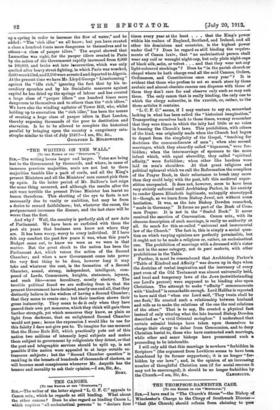-nth CANONS.
[To rem Enrros or THE "ssacraeos."]
Snt,—The writer of the letter signed "L. C. F. C." appeals to Canon xcix., which he regards as still binding. What about the other canons ? Does he also regard as binding Canon i., which requires "all ecclesiastical persons" to "declare four
times every year at the least . . . that the King's power within his realms of England, Scotland, and Ireland, and all other his dominions and countries, is the highest power under God" P Does he regard as still binding the require- ments of Canon lxxiv., that "no ecclesiastical person shall wear any coil or wrought night-cap, but only plain night-caps of black silk, satin, or velvet. . . and that they wear not any light-coloured stockings"? Does he "in the parish church or chapel where he hath charge read all the said Canons, Orders, Ordinances, and Constitutions once every year "13 It is evident that those who profess to set 80 much store by these archaic and almost obsolete canons can dispense with those of them they don't care for and observe only such as may suit them. The only canon that is really binding, the only one to which the clergy subscribe, is the xxxvith, or, rather, to the three articles it contains.
"L. C. F. C." seems, if I may venture to say so, somewhat lacking in what has been called the "historical imagination." Transporting ourselves back to those times, wemay remember that they were times in which the laity had little or no voice in framing the Church's laws. This prohibition, with others of the kind, was originally made when the Church had begun to depart from the simplicity of the Gospel, "teaching for doctrines the commandments of men" ; when also second marriages, which they absurdly called "bigamous," were for- bidden; when the intermarriage of sponsors to the same infant which, with equal absurdity, they called "spiritual affinity," were forbidden; when other like burdens were laid on men's shoulders. At that great religious and political upheaval which we call the Reformation the compilers of the Prayer Book, in their reluctance to break (any more than they could help) with the past, left this medieval super- stition unrepealed. It does not, however, seem to have been very strictly enforced until Archbishop Parker, in his anxiety to render Queen Elizabeth legitimate, unhappily stereotyped it—though, as we learn from Bishop Jewel, not without some hesitation. It was, as the late Bishop Dowden remarked., "made in Germany." It forms no part of the Book of Corn.. mon Prayer. It is not in the "Sealed Book." It never received the sanction of Convocation. Canon xcix., with its obscene description of such marriage, is really no authority at all. So much for this so-called "universal and immemorial law of the Church." The fact is, this is simply a social ques- tion on which varying opinions are perfectly permissible, but it ought not to be made a religious or, rather, an ecclesiastical one. The prohibition of marriage with a deceased wife's sister is not in the same category, not in pan; materia, with other prohibitions in the Table.
Further, it must be remembered that Archbishop Parker's "Table of Kindred and Affinity" was drawn up in days when the doctrine of verbal inspiration and the inerrancy of every part even of the Old Testament was almost universally held, and local and temporary laws of the Jews (notwithstanding our Lord's protest) were supposed to be binding also upon. Christians. The attempt to make " affinity " commensurate with "kindred" is remarkable enough. Lord Halifax is reported to have said that "when our Lord said, 'They twain shall be one flesh,' He created such a relationship between husband and wife as to make the relations of the one the real relations of the other." That is to say, He created a physical fact instead of only uttering what the late learned Bishop Dowden. described as "a vivid Oriental metaphor." I understand that certain colonial bishops have taken upon themselves to charge their clergy to debar from Communion, and to deny Christian burial to, those who have contracted such marriage, while other and saner bishops have pronounced such a proceeding to be intolerable.
I will only add that this marriage is nowhere "forbidden in Scripture" (the argument from Leviticus seems to have been abandoned by its former supporters); it is no longer "for- bidden by our laws"; and, in the opinion of an increasing number of thoughtful Christian men (if for social reasons it may not be encouraged), it should be no longer forbidden by






































 Previous page
Previous page